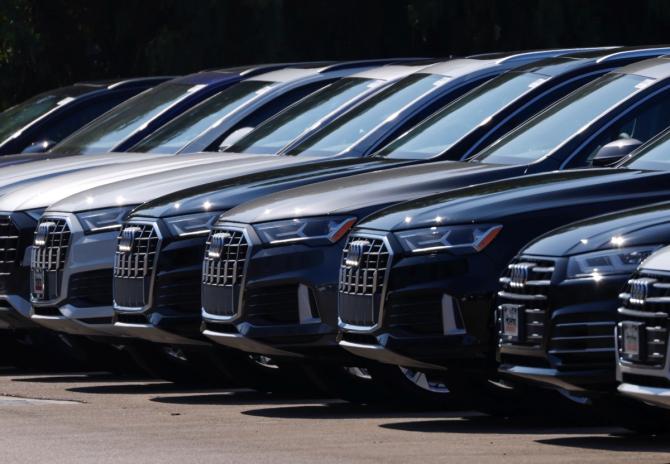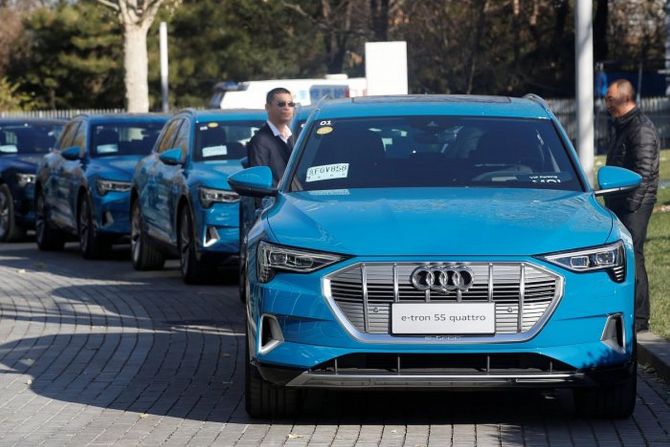Mercedes-Benz India, BMW India and Audi India have lined up over 50 new model launches as they seek to recoup previous year's loss in volumes, reports Shally Seth Mohile.

After touching a decadal low in 2020, luxury carmakers in India are back with a vengeance.
The top three firms -- Mercedes-Benz India, BMW India and Audi India that account for the lion's share of the segment -- have lined up over 50 new model launches as they seek to recoup previous years' loss in volumes.
Thanks to the pandemic, sales of super-premium models (those priced over Rs 30 lakh) in 2020 were almost pushed back to 2010 levels (see table). The year-on-year decline, too, was a whopping 40 per cent.
Even as the recovery in the Covid-19 pandemic remains patchy and high taxation weighs in on buyer sentiment, companies are optimistic that the new launches will rekindle excitement in a segment that accounts for less than 2 per cent of India's passenger vehicle market.
This pales in comparison with China where the share of the luxury car segment is 13 per cent and the US where such high-end models account for 10 per cent of the car market.

A high taxation structure, among other factors, has limited the expansion of the segment. Even in its best year -- 2018 -- it was far away from the 50,000-mark.
Automobiles attract a goods and services tax rate of 28 per cent. The additional cess on top of the duty makes the effective tax on luxury cars as high as 50 per cent. India also levies more than 110 per cent import duty on fully built cars.
To be sure, luxury carmakers are riding high on the month-on-month uptick in sales and improving macroeconomic cues.
They believe a strong preference for personal mobility will also hold them in good stead. They expect new launches and last year's low base to help them drive double digit growth in the current year.
Take BMW India, for instance. The second largest luxury car maker in the pecking order plans to launch at least 25 new models (includes BMW Motorrad bikes, BMW and Mini brands) in 2021 and expects to end the year in high teens, said Vikram Pahwa, president BMW Group India, on the sidelines of the launch of the BMW 3 Series Gran Limousine.
Recently, luxury car market leader Mercedes-Benz India said it will launch 15 new models in 2021.
“This will be the highest number of models we have ever launched in India in a single year and will include facelifts of existing models and completely new models. We expect a strong recovery in the next two years and a 40 per cent year-on-year (y-o-y) growth in each year,” Martin Schwenk, MD & CEO, told Business Standard in a recent interview.

At the start of the year, Balbir Singh Dhillon, head, Audi India, said the Volkswagen group firm would bring almost a dozen new models to India to fill the product gaps in its line-up.
Among the luxury car majors, Audi has seen a steady drop in volumes from a high in 2015.
So what explains this optimism among luxury car makers given that job losses are yet to be reversed significantly? And does this strategy make sense?
At least part of the reason for the expectations of pick-up could be that, as Kavan Mukhtyar, Partner and Leader, Automotive at PwC, pointed out, the fundamentals of the economy haven't changed and it is expected to bounce back by FY22 as the vaccine programme expands.
Also, despite the high rate of taxation on luxury cars, “many global manufacturers are looking at the Indian market as an important one, and they want to take growth to the next level,” he added. That partly explains the aggressive pace of launches.
Although this market is unlikely to see brisk growth given that people are still recovering from job losses, salary cuts and business closures, new launches will bring back the excitement to some degree.
But Puneet Gupta, director, IHS Markit, believes the road ahead for these companies may not be smooth. “New launches alone cannot guarantee success,” he said.
Besides the tax burden, he pointed out that premium car makers also have competition from mass market players that are launching new models in the premium segment at attractive prices.
“Why would someone consider an entry-level model in the luxury car segment if they can get a premium SUV at the same price,” he asked.
Meanwhile, frequent policy changes and taxation have also stymied the growth of the segment, he said.
Schwenk, along with his peers, has been lobbying for a reduction in cess and rationalisation in import duty.
But with the government urgently in need of funds to stimulate the economy, it is unlikely to risk the political optics of cutting taxes for something like luxury cars.
So these accelerated launch programmes may well find themselves in the slow lane soon.
Feature Presentation: Rajesh Alva/Rediff.com












 © 2025
© 2025